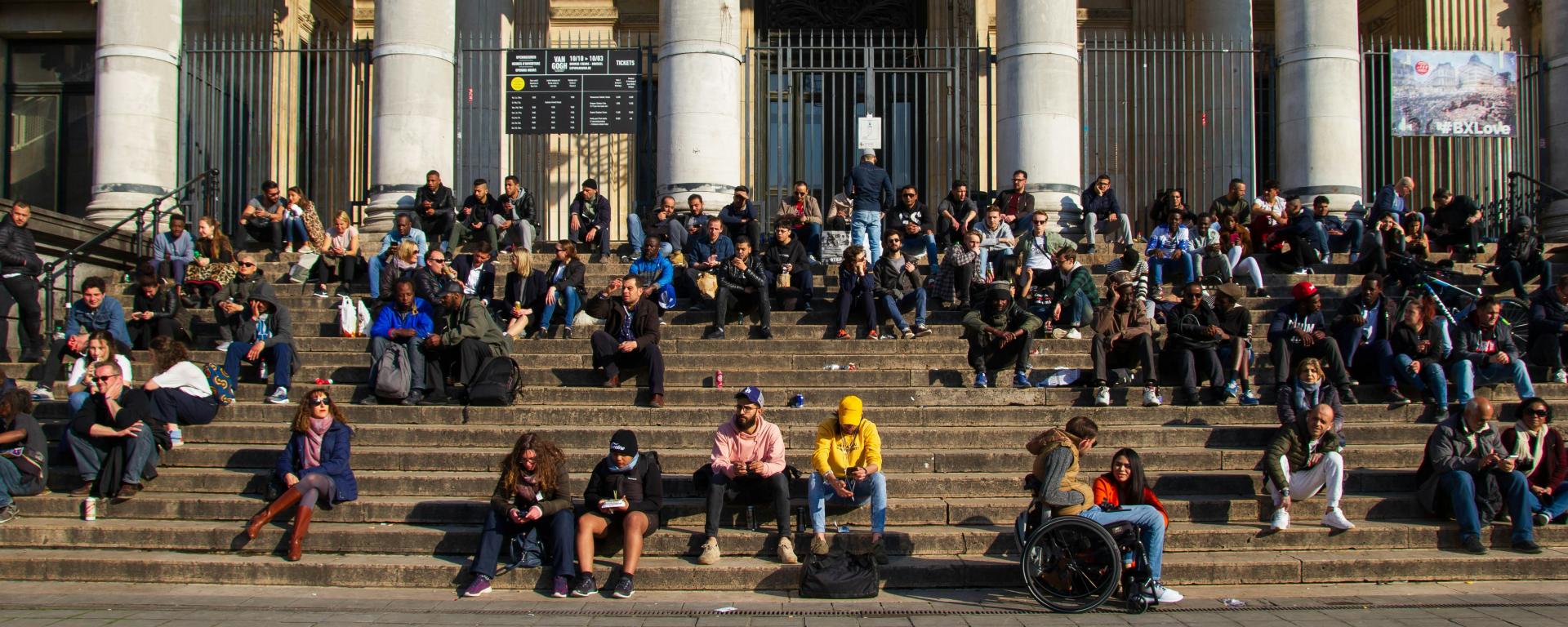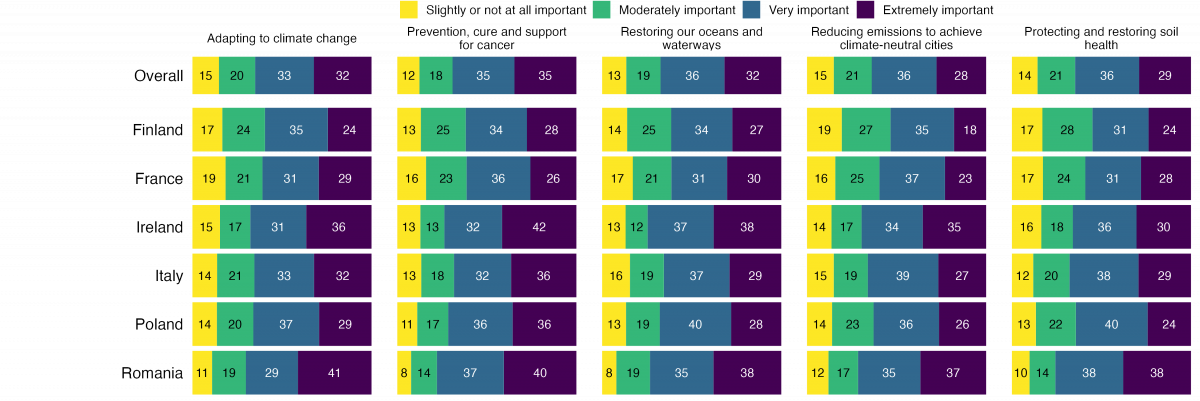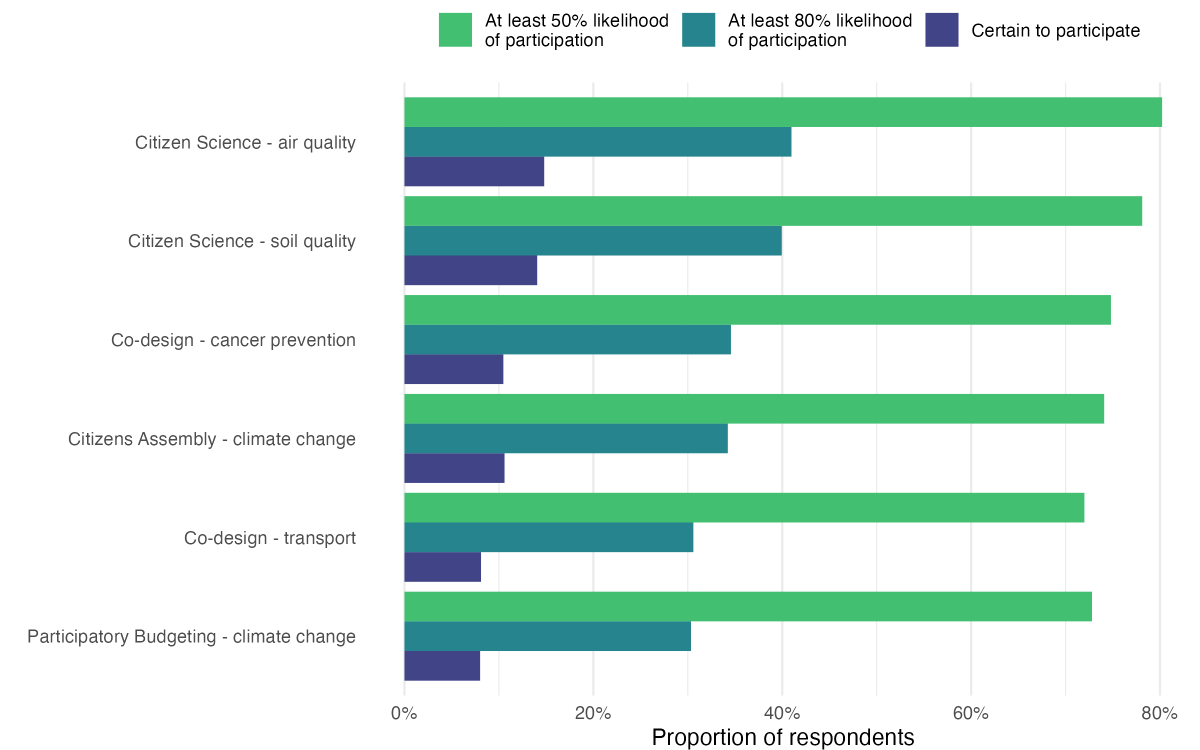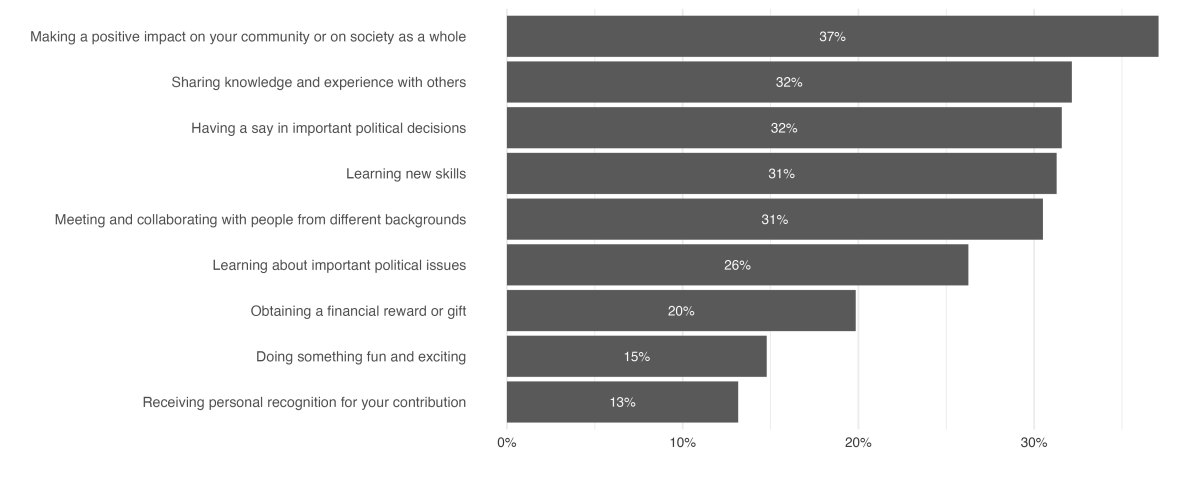
Through our work with the European Commission to promote policy experimentation and ensure citizens’ engagement in the EU five societal missions, we gathered insights from a survey of 4600 people from six EU Countries about their motivations and attitudes to citizen engagement. This blog outlines some of the key insights from the survey.
With more than 40% of the world's population heading to the polls in 2024, there has rightly been a lot of focus on the health of democracy. But as headline-grabbing as this year of elections will be, the ballot box alone won’t be enough to fend off the challenges to our representative system. Indeed, many of the most important election issues, such as the significant changes required to how we all live and work to take action on climate change, will be defined by the ability to involve the public in everyday action and decision-making. If done well, it can increase public ownership and buy-in to changes that need to happen. Failing to do this risks polarising opinion in a way that potentially puts achieving agreement on the changes needed out of reach.
There is an urgent need for innovative approaches that can increase citizen participation and breathe life into the declining state of many of our democracies.
The European Commission has made citizen participation a key element of its EU Missions, a €1.8 billion innovation programme targeting five ‘wicked’ issues, with the aim of improving both our individual health and the health of the environments we live in. Across Europe, projects are exploring how best to involve the public in developing new ways of fighting cancer, improving soil health, cleaning up our rivers and seas, building climate-neutral ‘smart cities’ and adapting to climate change.
But how do people want to be involved, what motivates them and how can we ensure that large, ambitious participation programmes are designed around European citizens' interests, enthusiasms and motivations?
Nesta’s Centre for Collective Intelligence Design and the Innovation Growth Lab worked with the European Commission to try and answer this daunting question. Together we surveyed over 4600 people across six EU countries (Finland, France, Ireland, Italy, Poland and Romania) to gauge how much of an appetite there was for taking part in government initiatives developing citizen-led solutions to these big challenges.
How important do citizens think it is that they are involved in addressing the five societal (mission) challenges

The good news is that people across Europe want to be more involved in solving societal challenges. Two out of three think it is very or extremely important that citizens are involved in addressing the five EU Missions.
The bad news? A lack of trust in public institutions, low awareness and a lack of access to decision-making. These are the biggest barriers to people’s participation, keeping us from making the most of their problem-solving potential.
In our recently-published policy brief, we outline key insights from our survey and what this means for citizen engagement in shaping and delivering on ambitious policies such as the EU missions.
While the brief is packed with detailed insights and data, four broad themes stood out:
1. Everyone is concerned but young people are concerned least.
Generally, people across Europe had a high level of concern for all challenges. Less than 10% said they weren’t concerned about any of them. Though people were most concerned about cancer (52% were very concerned), even the issue they were least concerned with - soil protection - had substantial numbers engaged with the problem (39% were very concerned). But, worryingly, out of all the age groups, young people tended to be the least concerned. Taking climate change as an example, only 35% of 18 to 24 year olds said that they were “very concerned” about adapting to climate change compared with 51% of over 65s.
2. A majority want to take part but everyone wants to do it in different ways
We wanted to understand what would make people more likely to participate in citizen engagement. To do this, we asked people how likely they were to take part in six hypothetical activities (see below). Each scenario combined a specific method of engagement with a specific issue related to an EU Mission. For example, one scenario focused people's interest in participating in a hypothetical Citizens’ Assembly on climate change set up by their municipality. In this scenario, the experiments were on whether mentioning different levels of political commitment from the municipality to implement assembly recommendations and differences in the amount of monetary compensation would have an impact on people's willingness to participate.

Across all the scenarios the majority of respondents expressed an interest in participating if given the chance. However, their level of commitment varied according to the type of activity, not just how concerned they were about a particular issue. Perhaps unsurprisingly, that suggests that different types of initiatives appeal to different types of people. For example, some respondents who said they were very likely to participate in a citizens' assembly said they were less likely to participate in a citizen science project.
3. Community and societal benefits are more motivating than personal gains
Although we might assume that involvement was dependent on how much an issue affected someone directly, we found that people said they are more motivated by benefiting others – especially by making a positive impact on their community, sharing knowledge, and having a say in political decisions. The only exception to this was that learning new skills was seen as an important motivation factor.
In addition to this, it was notable that people highlighted the need to see benefits on a local level. For example, 60% said they were somewhat or extremely likely to volunteer for a project that would directly benefit their community, against 48% saying the same for a project that would benefit Europe as a whole.
Most important factors in decisions about whether to participate in activities addressing societal challenges

4. A lack of opportunity, not a lack of interest, is the biggest barrier to participation.
When asked what they thought were the biggest barriers to participation, people highlighted a lack of awareness and lack of trust in public institutions as the most significant. Lack of interest in participation or not having enough time were, in most cases, seen as the least significant barriers.
Implications for how we think about citizen participation
Good engagement is hard to do requires resourcing and a commitment to sharing power and decision making between institutions and citizens. There are no easy fixes. With this in mind our survey does present a number of insights relevant to governments and public institutions thinking about citizen participation.
- Create opportunities to participate and people will come: Perhaps the biggest takeaway from our survey is the high interest in participation. If institutions, from the European Commission down to city adminstrations can create opportunities to participate, people will take part, especially if they can see local benefits.
- Target young people to increase awareness: While young people were interested in citizen engagement, they showed the lowest levels of concern about the five challenges. Without deep commitment from young people we won’t be able to tackle climate change and other big social challenges. More needs to be done to design citizen engagement around young people, for example through Citizens Assemblies, Citizen Science or Participatory Budgeting initiatives specifically targeting young people.
- Invest in a diversity of engagement methods: While it can be easy to default to one or two of the most often cited methods for engagement, such as citizen assemblies, we found a significant variety in the types of engagement activities people were interested in as well as how (alone or in groups, online or offline etc.). This highlights that there is no ‘one size fits all’ approach to engagement. Any programme needs to employ a diverse range of methods to reach large and diverse groups of people.
From citizen assemblies and participatory budgeting to citizen science we need approaches that increase people's involvement - because our research has found that across Europe the appetite is there. If done well, these approaches can both help increase turnout at the polls and our trust in public institutions as well as our capacity to understand and solve complex challenges such as climate change. Giving the public ownership and agency in how we make decisions about the inevitable changes we will need to make to society and how we live our lives can lead to better and more sustainable long-term solutions to some of the EU’s biggest challenges.
This blog is a summary of the findings developed in "Peter BAECK, Rob FULLER, Christopher EDGAR, Andrea BLASCO, Edoardo TRIMARCHI, James PHIPPS (2023) “Citizens’ awareness of EU missions and opportunities for citizen engagement: Results from a multi country survey”. European Commission, R&I Policy Series"
